Ginger is an Asian herbaceous plant whose root is actively used for medicinal purposes. But despite the fact that the beneficial properties of the plant have been known for many centuries, it is important to understand that ginger also has certain limitations and contraindications for use, which you should familiarize yourself with before taking it as a medicine.
Content
- 1 Composition and general beneficial properties of ginger
- 2 Contraindications and harm to ginger for the body
- 3 Dosage Forms and Prescriptions
- 4 How to take ginger
- 4.1 For weight loss
- 4.2 With diabetes
- 4.3 Benefits for women
- 4.4 Benefits for men
- 4.5 Digestion normalization
- 4.6 For cough, cold, sore throat
- 4.7 Immunity increase
- 4.8 Cancer prevention
- 4.9 For joint pain and rheumatism
- 4.10 Toothache
- 4.11 In cosmetology
- 4.12 Use during pregnancy, breastfeeding and in childhood
- 5 Storage rules
- 6 Common questions
Composition and general beneficial properties of ginger
The plant is rich in trace elements and vitamins necessary for the normal functioning of the human body. However, it is worth considering that the rhizome (the underground shoot of a flower that is mistakenly considered the root of the plant) has the most useful composition.
The product contains:
- essential oils;
- resinous compounds;
- starch;
- sugar;
- lipids;
- fats
- niacin;
- unsaturated fatty acids;
- asparagine;
- Tsingibern;
- gingerol;
- fellandren;
- choline;
- camphene;
- essential amino acids;
- trace elements (Zn, Fe, Mg, Ca, P, Na, K, Si, Ge, Cr and Al);
- vitamins A, C, K, and group B.
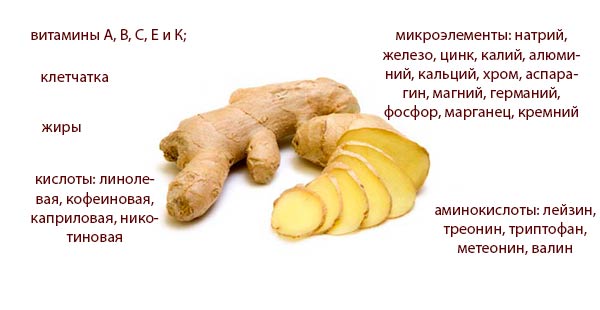
The rhizome of the flower has an expectorant, warming, analgesic, antibacterial, anti-inflammatory, carminative, diaphoretic, immunostimulating, cancer protective and mild sedative effect. The unique composition of the plant allows it to be used for the treatment and prevention of a large number of diseases and pathological conditions:
- Ginger restores the hormonal background, regardless of the gender of the person. Taking rhizomes helps alleviate the symptoms of menstruation in women, and also stimulates potency in men. The underground shoots of plants are actively used to treat female infertility.
- Resinous substances in the root have a disinfecting effect and accelerate the process of repairing damaged tissues.
- In addition, the plant improves digestion by normalizing gastric secretion, thereby helping to get rid of the symptoms of indigestion and flatulence.

Beneficial features - The plant is actively used for the treatment of acute respiratory viral infections, due to its expectorant, antimicrobial, diaphoretic and immunostimulating effect.
- Ginger root removes nausea, due to which it is used for the prevention of motion sickness syndrome and toxicosis in early pregnancy.
- The ability of a plant to inhibit the vital activity of parasites is used for helminthic invasions.
- Regular use of the plant helps to strengthen the vascular wall and remove "bad" cholesterol from the body.
- Chewing the rhizome of the flower after each meal will help get rid of the unpleasant odor from the oral cavity and improve the quality of the teeth.
- Essential oils of the plant have a calming effect on the human nervous system.
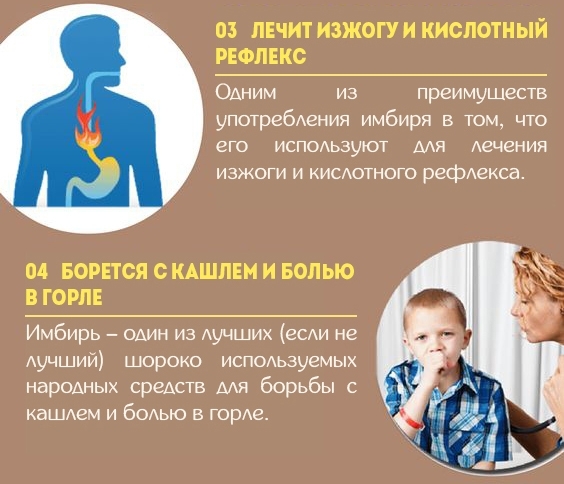
Beneficial features - Due to the ability of plants to accelerate metabolism, it is an indispensable tool for weight loss.
- The plant is used for poisoning, since it helps to remove poisons and other harmful substances from the body.
- In addition, the beneficial effect of the plant on the cognitive abilities of a person and his physical performance was noticed.
 You may be interested in:
You may be interested in:Contraindications and harm to ginger for the body
Despite the number of medicinal properties that the plant rhizome possesses, caution should be exercised when taking it.
The product is contraindicated in:
- individual intolerance to the plant;
- bleeding
- heat;
- burns;
- gastrointestinal ulcer;
- gastritis;
- gallstone disease;
- diverticulitis;
- diverticulosis;
- food reflux;
- arrhythmias;
- heart disease
- hepatitis;
- cirrhosis;
- tumor neoplasms.
In the case of the use of plants with these pathologies, a worsening of the course of diseases can be observed. Ginger-based medications should not be taken at bedtime, as they can cause insomnia.
Excessive consumption of ginger can lead to the appearance of unwanted adverse reactions, among which:
- Visual impairment.
- Dry and irritated skin.
- Arrhythmia.
- Sleep disturbances.
- Emotional instability.
- Nausea.
- Vomiting
- Diarrhea.
Dosage Forms and Prescriptions
Ginger is a unique food culture that has been used for thousands of years as a spicy seasoning for dishes, and juice is added to sauces, salad dressings and even drinks. Ginger is also added to tea, pastries, preservation and even alcohol.
Tea
Ginger tea is a tonic that helps the body cope with a cold.
Beverage Ingredients:
- Ginger root - 2-3 pieces.
- Lemon - 2 slices.
- Honey - 1 tsp.
- Cinnamon to taste.
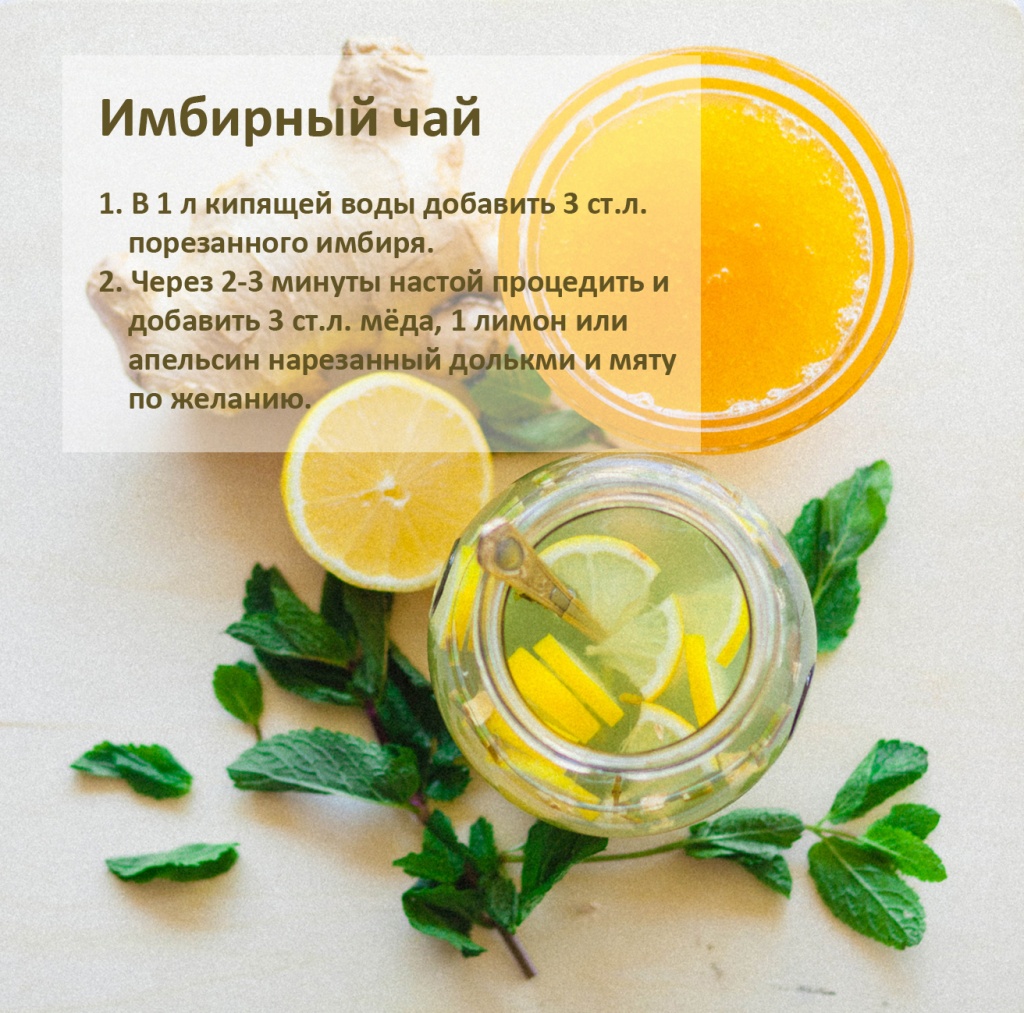
Ginger with lemon is poured with boiling water and infused for half an hour. Honey and cinnamon are added to the infused and slightly cooled tea.
Tincture
To prepare the tincture:
- It is necessary to take 30 g of the flower root grated on a coarse grater and 200 ml of vodka.
- Ginger is placed in a container of dark glass, filled with vodka and tightly closed with a lid for further infusion in a warm and dark place for 2 weeks.
- Shake the tincture daily.
- Before use, the liquid is filtered. To improve the taste of the medicine, honey and lemon juice can be added to the tincture.
Seasoning for dishes
Due to the pronounced aroma and burning taste, the product is used as a supplement to various dishes, and ginger powder is added to various combined seasonings.
For seasoning, grind dried ginger in a coffee grinder to a powdery state. This spice is an indispensable element of Asian cuisine, giving a characteristic burning aroma to all dishes. Spice goes well with meat, fish and vegetables, complementing and shading these foods.
Juice
Plant juice is the main set of sauces and salad dressings. It can also be added to various refreshing and tonic drinks. To obtain the juice, the root of the plant must be grated and squeezed out the liquid obtained from the slurry.
Pickled Ginger and Desserts
Pickled root of the plant is actively used in cooking in Asian countries. In order to pickle 250 g of ginger, you need to take:
- Salt - 1 tsp.
- Water - 2 tbsp.
- Sugar - 1 tbsp. l
- Beets - 1 slice.
- Vinegar - 1 tbsp. l
Cut the root into thin slices and pour 1 cup of salted boiling water. The product should be in salt water for 5 minutes, after which the water is drained, and ginger is poured with 1 cup of sweet boiling water.Ginger is in sweet water until it cools completely. After this, beets and vinegar must be added to the product. Infusion time is 12 hours.
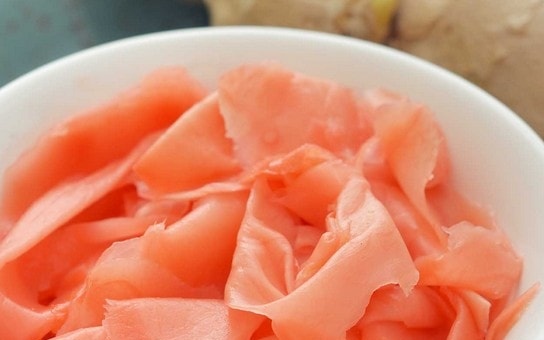
Confectioners quite often add dried or fresh ginger to various pastries, buns, gingerbread cookies and muffins. Ginger syrup is used to make candy and jam.
 You may be interested in:
You may be interested in:How to take ginger
The choice of the dosage form of ginger directly depends on the type of disease or pathological condition.
For weight loss
Adding the product to the diet helps to speed up the metabolism, which helps to lose weight, because quite often the cause of obesity is improper metabolism. For weight loss, it is recommended to use fresh ginger root or as a spice.
Ginger tea with lemon, honey and cinnamon is also used for weight loss. It is recommended to drink the drink in the morning 30-60 minutes before a meal.
With diabetes
Fresh use of the product not only triggers the body's metabolic processes, but also lowers blood sugar, which is especially important for people with diabetes.
Benefits for women
The root of the flower alleviates the symptoms of painful menstruation and menopause. Also, the plant is used to treat infertility, since its use normalizes the female hormonal background. Women are recommended to drink 2 cups of ginger tea per day.
Benefits for men
Since ancient India, ginger is considered a powerful aphrodisiac and is actively used as a means of increasing sexual desire. Spice stimulates potency by improving blood circulation in intimate areas.
To enhance potency, it is enough to take 30 g of fresh root at bedtime for 30 days. It is better to drink the root with warm green tea with sugar. Therapy will also have a beneficial effect on the hormonal background of a man. As an aphrodisiac, the product is also recommended to be taken fresh 60 minutes before the onset of sexual intercourse.
Digestion normalization
Spice helps to normalize digestion by enhancing the secretion of gastric juice and accelerating metabolic processes. To normalize digestion, you can use the product in fresh or dried form. Ginger tea also has beneficial effects on digestive processes.
For cough, cold, sore throat
Tea from ginger, honey and lemon will help get rid of cough and other cold symptoms. Drinking a warm drink is necessary until complete recovery. The maximum daily dose is 2 liters. A sore throat will help relieve ginger juice, with the addition of salt.
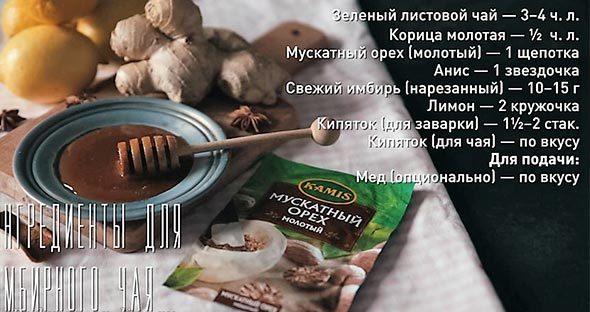
It is enough to take 2 tbsp. tablespoons of this mixture 3 times a day for half an hour before meals. However, it is worth considering that the product has a warming effect on the body. The presence of high temperature is a reason to abandon ginger tea.
Immunity increase
Both a fresh product and medicines based on it, such as tea or alcohol tincture, enhance immunity. Tincture should be taken for 1 hour. spoon at a time for 14 days. Multiplicity of admission - 3 times a day.
Cancer prevention
It is believed that the regular addition of spices to the diet helps to minimize the likelihood of developing cancer.
For joint pain and rheumatism
A compress from the crushed root of the plant to a state of powder will help get rid of pain in the joints. The powder must be mixed with a small amount of warm water to obtain a pasty consistency. The paste is applied to the problem area, covered with polyethylene and fixed with a cloth or bandage. The compress is left on the problem area for 8 hours. The duration of therapy is 14 days.
Toothache
The product is able to quickly stop a toothache. To do this, the root is ground to a state of slurry and is applied directly to the tooth or laid in its hollow. The paste should be on the tooth for 30 minutes to consolidate the desired effect. In the first minutes after applying the slurry, the pain may intensify, but, as a rule, after 5-10 minutes the pain syndrome will completely disappear.
In cosmetology
Spice is used to restore smoothness of the skin and eliminate various skin inflammations (acne, ulcers, boils, abscesses). To prepare an acne tonic, you must mix the plant juice with water in equal amounts. You can remove irritation or skin sores with a cotton pad soaked in rhizome juice.
It is enough to apply a moist cotton pad to the damaged area for several minutes, so that the active substances of the juice have a local effect. You can repeat the procedure once a day until the problem completely disappears.
Use during pregnancy, breastfeeding and in childhood
Ginger is a popular remedy for the symptoms of toxicosis during pregnancy. But, despite this, during pregnancy it should be used with extreme caution, and in the third trimester, you should completely refuse to take it.
During lactation, it is not recommended to use spice, since its active substances penetrate into the breast milk of a woman and can cause sleep disorders and restless behavior in the baby. Spice is not recommended for children under 2 years of age due to its ability to irritate the gastric mucosa.
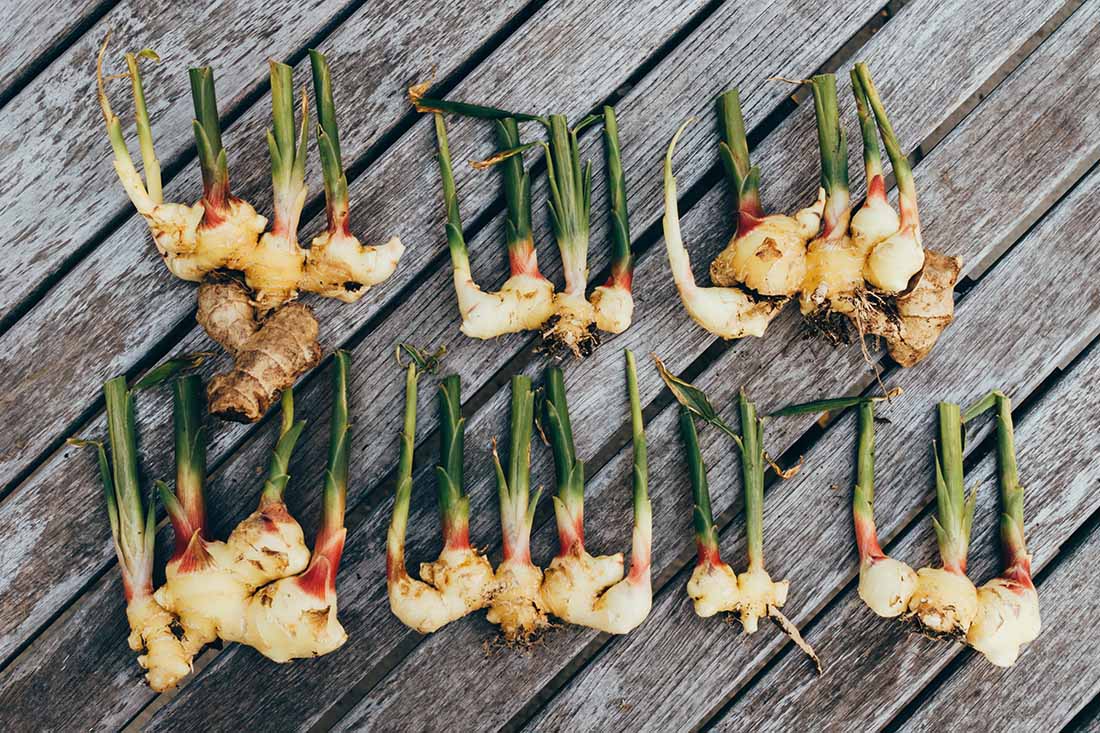 You may be interested in:
You may be interested in:Storage rules
The product can be stored fresh, frozen and dried. In the refrigerator, the spice can be stored for a rather long time, but it should be borne in mind that after a week of such storage the amount of nutrients in it is halved. For this reason, the product must be stored in the refrigerator for no more than 6 days. The lower shelves of the refrigerator or a special department for vegetables are perfect as a storage space.
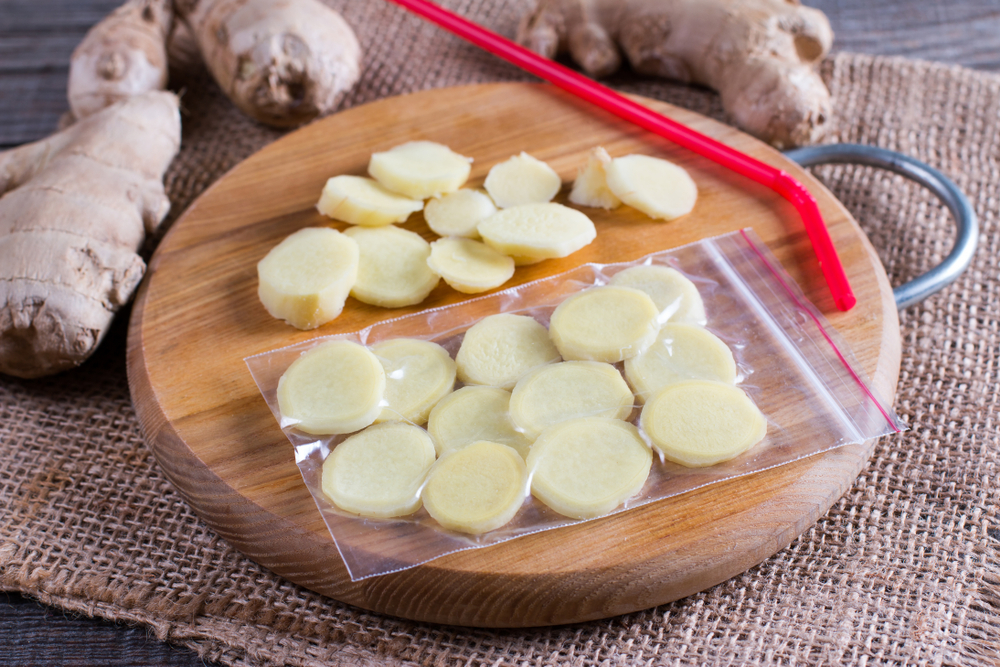
When a product is frozen, its taste and medicinal properties are fully preserved. In the freezer, ginger is best stored in crushed form and wrapped in a plastic bag. Such storage will allow breaking off the necessary amount if necessary, without the need to defrost the entire product. Frozen rhizomes can be stored for up to 3 months.
Another way to preserve the useful and palatability of a product is to dry it. Cut into thin slices and dried product can be stored in an airtight container for more than 6 months. Spice can also be stored in combination with honey, as it is an excellent preservative. For such storage, grated root is enough to add to high-quality honey.
Common questions
When taking any plant with medicinal properties, questions arise regarding its tangential effect on the body, and ginger is no exception.
Ginger is a useful food culture that has found its use not only in cooking, but also in traditional medicine and has been used for many years to treat and prevent various diseases.

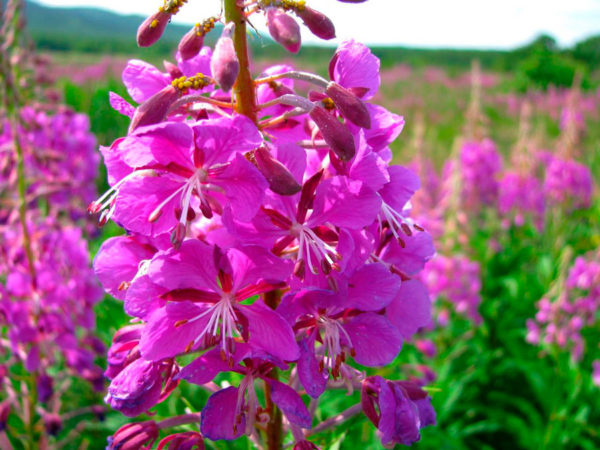
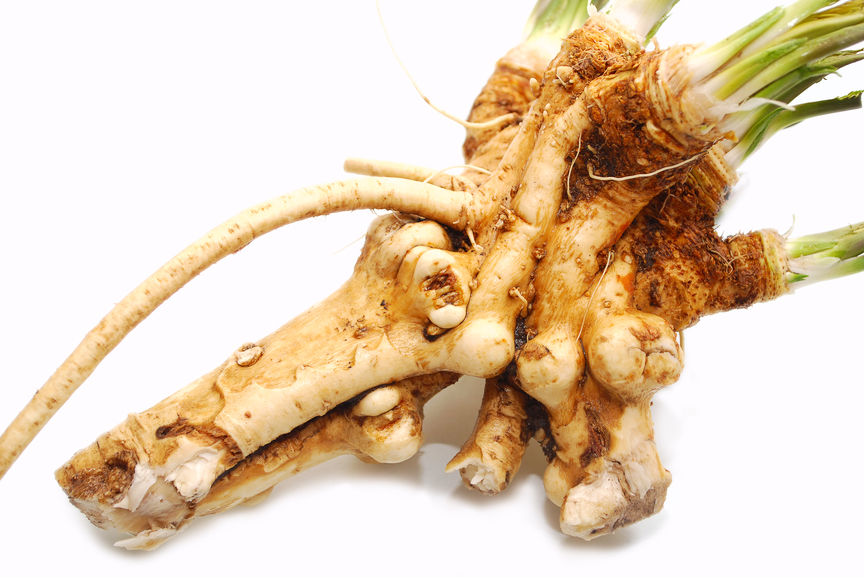
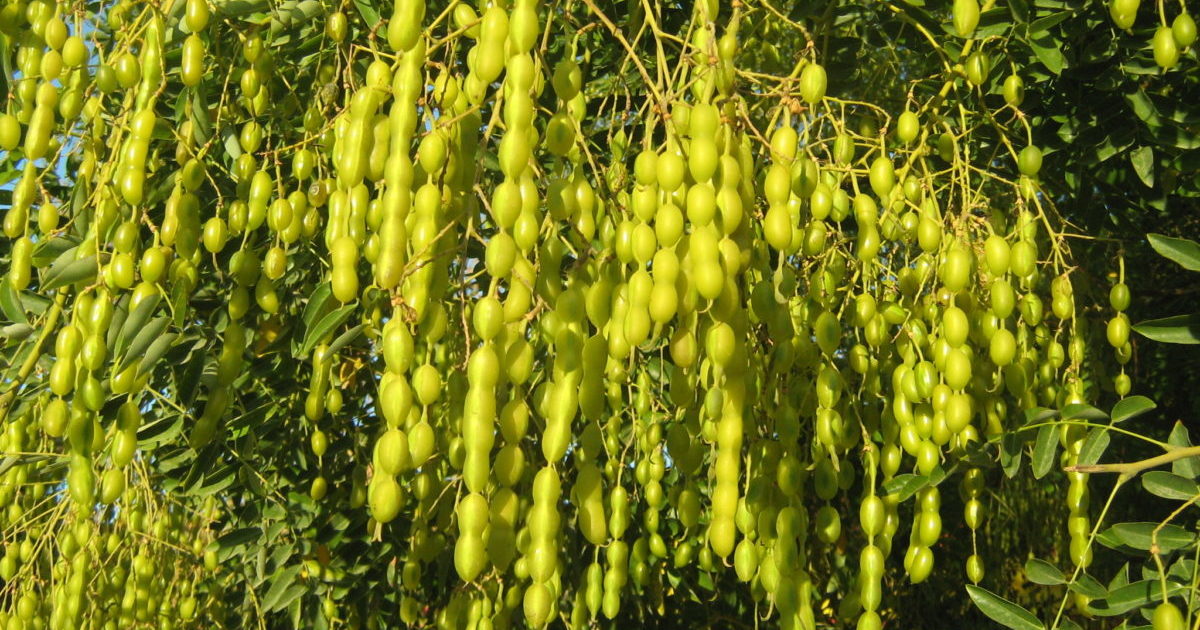
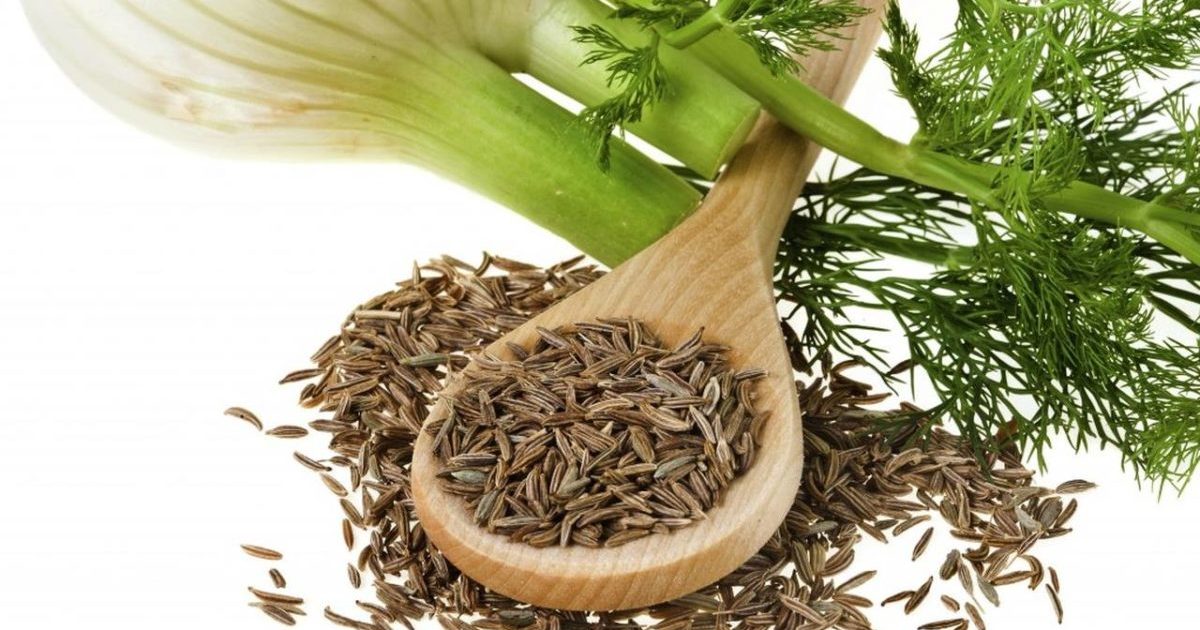 Fennel - beneficial properties and contraindications
Fennel - beneficial properties and contraindications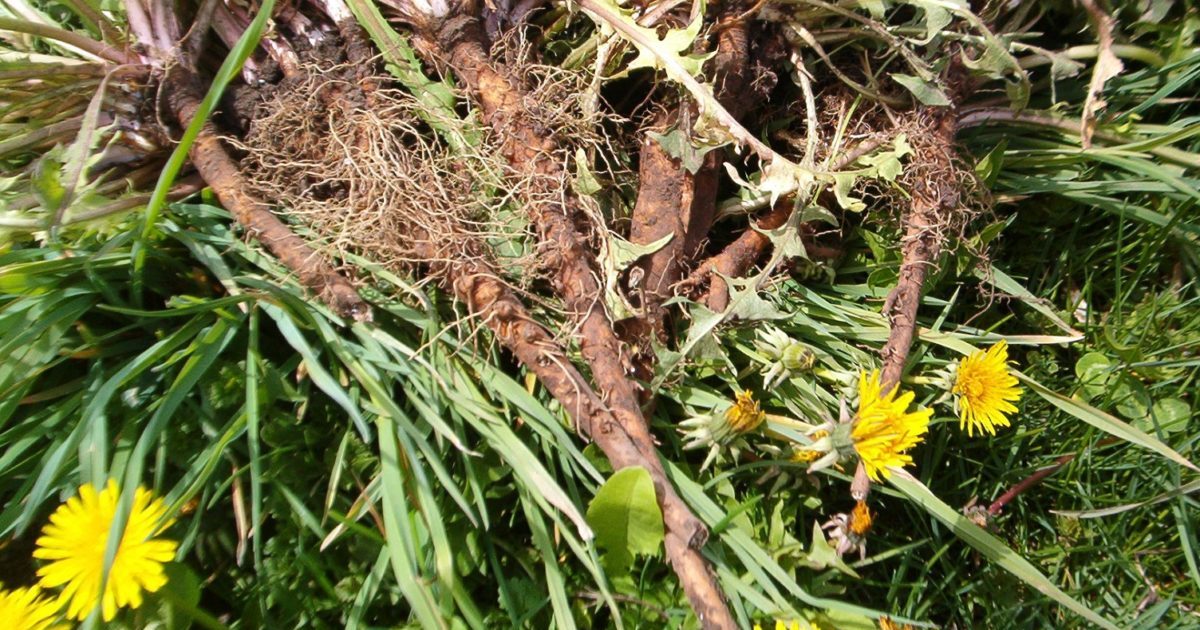 Dandelion Root - Health Benefits and Contraindications
Dandelion Root - Health Benefits and Contraindications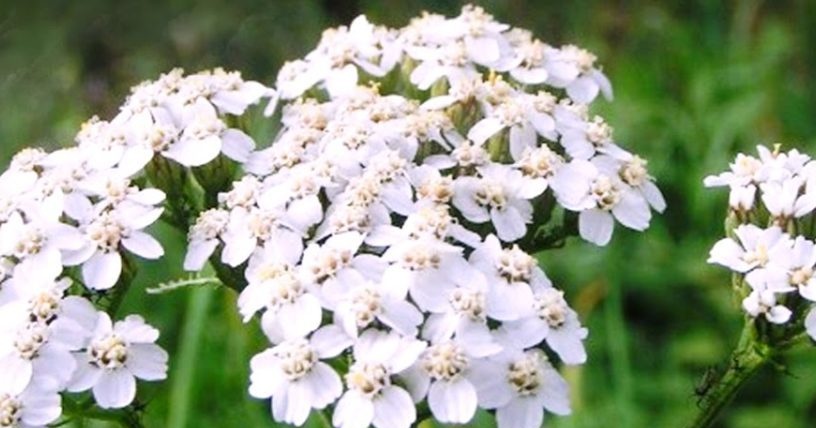 Yarrow - beneficial properties and contraindications for health
Yarrow - beneficial properties and contraindications for health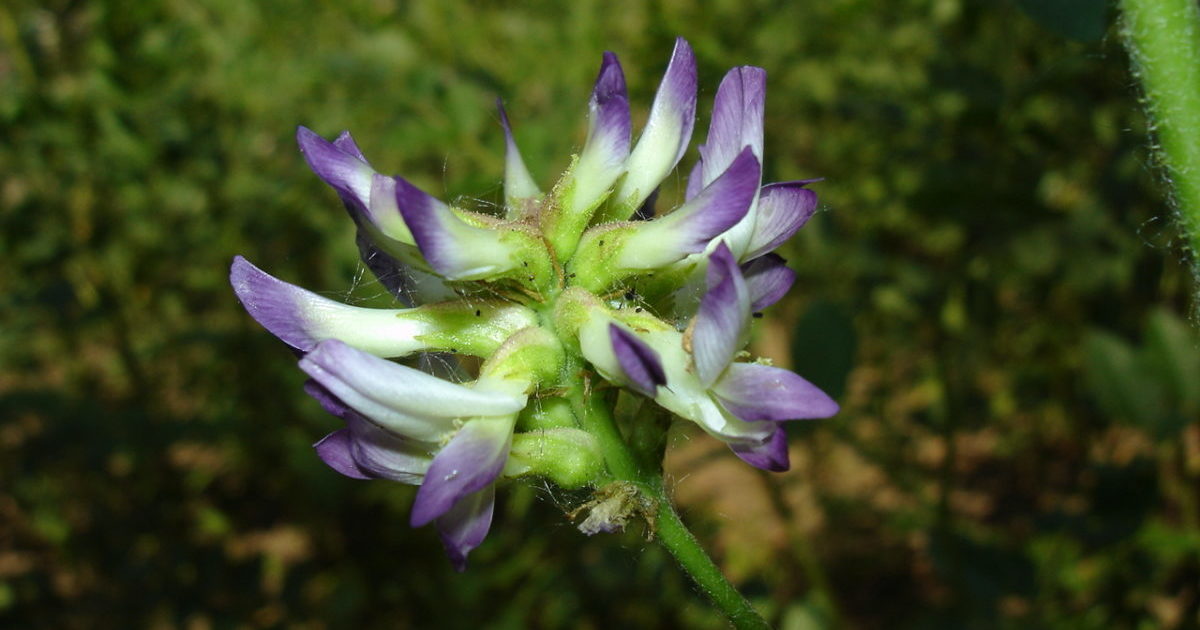 Licorice - beneficial properties and contraindications for health
Licorice - beneficial properties and contraindications for health